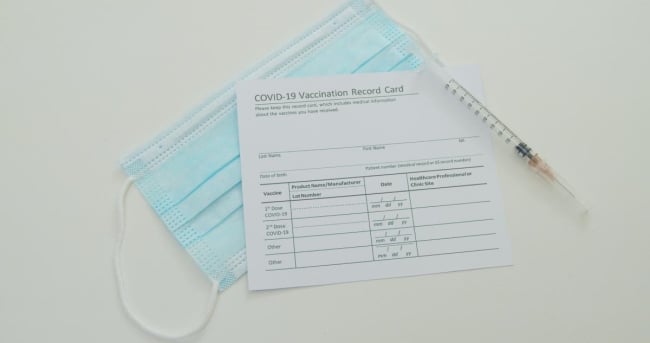You have /5 articles left.
Sign up for a free account or log in.

MyndziakVideo/iStock/Getty Images Plus
A new statement organized by the American College Health Association and signed by more than two dozen higher education organizations decries state-level restrictions barring colleges from requiring vaccination against COVID-19 or other public health measures such as mask wearing or surveillance testing. The statement describes such restrictions as “dangerous” and calls on government authorities “to empower colleges and universities to use every available public health tool to protect campuses and neighboring communities from a COVID-19 surge this fall.”
The statement, released Monday, notes that many of the state-level restrictions “directly contradict” guidance from the Centers for Disease Control and Prevention.
“State actions that prevent the use of established and effective public health tools at the same time as COVID-19 cases increase is a recipe for disaster,” the statement says.
“These restrictions undermine the ability of all organizations, including colleges and universities, to operate safely and fully at a time of tremendous unpredictability. Furthermore, these restrictions prohibit higher education institutions from taking responsible and reasonable public health measures and ultimately threaten the health and safety of students, faculty, staff, and neighboring communities.”
The statement comes as the highly transmissible Delta variant spreads, COVID-19 cases increase nationally and colleges increasingly introduce or broaden vaccination requirements and reimpose mask mandates. But even as more than 600 colleges nationwide have mandated COVID-19 vaccination for students or employees, colleges in a number of Republican-controlled states find themselves hamstrung by laws or executive orders restricting their ability to require vaccines or other public health measures.
“We and some of the other professional organizations have been hearing from our college health professionals and from college administrators, including vice presidents and presidents, that this restrictive legislation is tying the hands of our colleges in providing a safe environment into which students can return this fall,” said Gerri Taylor, co-chair of ACHA’s COVID-19 task force. “It has virtually tied their hands so that they will be unable to put into place the usual public health strategies that we’ve used over many, many years. I can remember many years ago when we had measles on campus and we needed to find out whether students had been immunized. Many schools had outbreaks and many schools then mandated measles vaccines, and we saw the cases drop precipitously.”
ACHA has recommended that colleges mandate all students on campus this fall be vaccinated against COVID-19. “We're going to see millions of college students going back to school in the next few weeks,” Taylor said. “We’re going to see more cases; there’s no doubt in my mind. The best way to prevent transmission is to have as many people as possible immunized.”
States that have prohibited governmental entities generally from requiring proof of COVID-19 vaccines through laws or executive orders barring so-called vaccine passports include Alabama, Arkansas, Florida, Georgia, Idaho, Indiana, Iowa, Montana, Oklahoma, South Carolina, Texas, Utah and Wyoming. (After Indiana passed a law banning vaccine passports, Indiana University amended its vaccine requirement to require students to attest to having received the vaccine, rather than requiring them to provide proof; in a ruling last month, a federal judge upheld the university’s requirement as constitutional.)
Some states have gone further. Florida bars public and private colleges alike from requiring vaccination against COVID-19 as a condition of enrollment or attendance. Oklahoma bars public and private colleges from not only from requiring vaccines but also from requiring mask wearing for individuals who have not been vaccinated.
After Arizona State University announced in June that unvaccinated students would have to wear masks and undergo twice-weekly surveillance testing, Arizona governor Doug Ducey signed an executive order saying that public colleges could not require vaccinations “or place any conditions on attendance or participation in classes or academic activities, including but not limited to mandatory testing and mandatory mask usage, if a person chooses not to obtain a COVID-19 vaccine.”
Texas governor Greg Abbott, who previously signed executive orders barring governmental entities from requiring COVID-19 vaccines or face masks, doubled down on that stance in a new executive order signed last week, two days after the CDC revised its guidance to recommend mask wearing in public for all people regardless of vaccination status in areas of substantial or high community transmission. The order prohibits governmental entities and private entities that receive any state funding from requiring vaccines, and also bars governmental entities from requiring masks, with certain limited exceptions for health-care facilities and jails.
Colleges in some of these states can encourage, but not require, vaccination or mask wearing.
The University of Oklahoma said in a statement last week that it “strongly encourages” masking in classrooms and other high-density settings.
“Taking into consideration the CDC’s recent guidance on masking, Oklahoma state law -- which prohibits any COVID-related mandates for students and educators in public schools -- and the state of the COVID-19 pandemic in Oklahoma, the university encourages masking indoors, and strongly encourages masking in high-density settings, such as classrooms and at special events,” the university’s statement said.
Senior administrators at Florida State University similarly said in a message to faculty and staff last week that they encouraged vaccination, mask wearing and testing.
“While our authority is limited by the State of Florida and the university cannot mandate vaccines, testing or mask wearing, we do promote these mitigation efforts,” said the message signed by Sally McRorie, provost and executive vice president for academic affairs, and Kyle Clark, vice president for finance and administration. “We encourage all students, faculty and staff to get the COVID-19 vaccine if they haven’t done so already. We also recommend wearing masks indoors, especially in situations where there are large gatherings that make social distancing difficult. And of course, anyone who is feeling ill or suspects they may have been exposed to COVID-19 should be tested.”
H. Holden Thorp, editor in chief of Science journals and former chancellor of the University of North Carolina at Chapel Hill, said colleges need vaccine mandates. In a recent op-ed in Science, he described the state-level restrictions as inappropriate.
“Like other measures to limit academic freedom and circumvent faculty expertise, this is another example of politicians and politically appointed trustees overreaching their appropriate roles in higher education policy,” he wrote.
“There are going to be a lot of people who get sick,” Thorp said in an interview. “You bring 50,000 college students and if 25,000 of them aren’t vaccinated, you’re going to have a pretty big outbreak.”
“To the extent that states are taking steps that are really handcuffing institutions, it is deeply troubling,” said Steven Bloom, assistant vice president for government relations at the American Council on Education, which is among the groups that joined with ACHA in issuing the statement condemning the state-level restrictions. “We have believed that institutions should have the flexibility to respond to this crisis in ways that make sense for their campus and make decisions and implement practices that are evidence-based, that are designed to protect students, to protect faculty, staff and the campus generally, and the communities in which the institutions exist.”








